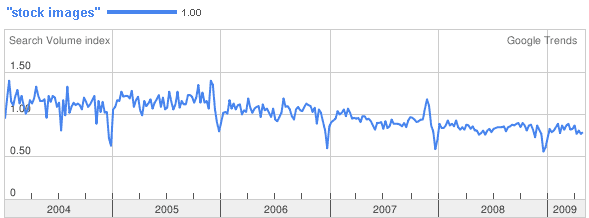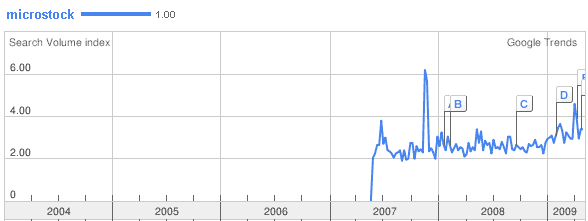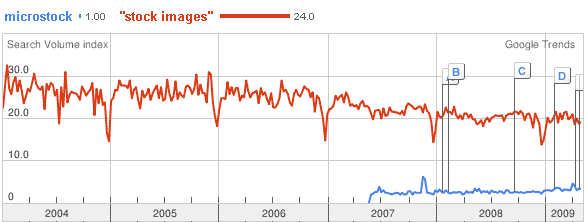 As some long term and full time stock photographers see a fall in their income from traditional RF agencies, we take a look at making the transition between traditional stock and moving more of your work towards microstock:
As some long term and full time stock photographers see a fall in their income from traditional RF agencies, we take a look at making the transition between traditional stock and moving more of your work towards microstock:
What's Happening?
We can draw a direct parallel here with the newspaper industry: The Internet is both the problem and the solution. It's not just one thing that's changed, customers expect more, more quickly, for less money. They find what they want in all sorts of new and different ways. The reason that a lot of prices have fallen in general is because of efficiencies in customer support, ordering and logistics (for digital assets) that the internet has brought. It's possible for stock photographers to earn similar amounts but still charge less for their work by working smarter. With all these changes the stock photography business has been forced to change, few people feel quite so sure where it is heading.
Several years ago I used to be quite happily selling CDs of stock photos to people online, these unsurprisingly, no longer sell - times have changed. Times have also changed for traditional royalty free stock agencies. They must now make their workflow 100% digital, efficient, streamlined; have their images found in Google, get involved in innovative online marketing - the list goes on... New customers have arrived who no longer expect to have their own account manager, negotiate prices etc, they want to search themselves and instantly download for a fixed price.
In writing all this I'm not trying to suggest that the sky is going to fall in, there will always be niches for people who want full service. A couple of interesting Google trend graphs will set the picture straight, although these can be interpreted in a few different ways:
Graph Notes:
- Graphs taken from Google trends May 2009 (Click each graph to view the source google graphs page with current up-to-date information)
- Marked points A B C etc. refer to related google news and can be ignored.
- Scale on graph is search terms compared to average over all time, see google trends for a full description
- You can see the Christmas 'feast then famine' in "stock images" searches.
- The downward trend in search for "stock images" is the same for "stock agency" "stock library" "stock photo".
Search for stock photo or stock image on google and you find microstock agencies in the first couple of places, but it might be unfair to compare the search 'microstock' as from a consumers point of view it is probably not one of their first search terms.
These graphs show interesting trends but when compared we can see that there are a lot more people searching for stock photos even if that number is gradually falling. We can only guess at why the number is falling: some might be searching for microstock instead, it's possible buyers have started to use agencies more, perhaps their search terms are more sophisticated e.g. "royalty free lifestyle stock photo"; also remembering that many of our new internet buyers might make one off purchases or have annual spends that are measured in tens of dollars not thousands.
My Income is Falling what can I Do?
While the industry is in a state of flux then don't put all your eggs in one basket. You might have been represented by a single agency before, and that might work for the new microstock world if you also do other work on the side (istockphoto exclusive stock + local event photographer). It is probably best to go with the flow and have your images represented by a selection of different agencies and agency types that suit your work
Test the waters with your work before you dive right in and off load your whole portfolio into microstock kissing goodbye to any old contract you had. Look at your portfolio, is it dated? Were those shots good 10 years back when they were difficult to create with film but now common because digital has made it 'easy'? Take a cold hard look (or have a consultant do it) and see if the reason your current sales are dropping is because your images are worth less in the current market.
Market your work, create an identity, the agency might have done it before but now it's your turn. It might perhaps not in a traditional sense like you have done before, the future is online and the marketing skills are very different. Many agencies who did not move to digital have seen their doors close, and those who were not fast enough to get all their images online have suffered a similar fate. The future will see the same for those who fail to embrace the way the internet works and changes - it moves fast.
Learn the technology, this has become one of the most important aspects of the industry, those who successful are those who work smarter, using the right tools and reduce the waste - lean enterprise works in manufacturing and it can be applied to your photography time.
Look to rights managed, That might sound like an odd thing to hear from microstockinsider but I think that RM still has plenty of life left in it. It's quite possible to have different images represented in all different stock image spheres if you have such a spread of work. Specialist and difficult to find images can still demand RM prices as can exclusivity so long your images are of the highest quality and style. Don't waste your time uploading 'simple stock' to such an agency if they already have it and identical images are to be found for $1 somewhere else.
Follow your passion, shoot what you love (within reason). More than ever the only thing that motivates and separates photographers is their love of their work. Without that passion you are fighting a battle against someone in another country who can do the same job for a fraction of the price.
Related Posts
Contemplating starting out in microstock
Getting Approved: The microstock photographer application process
Why not just sell your own images direct to buyers?
16 Things the beginning microstock photographer should know






It's quiet in here! Add new comment